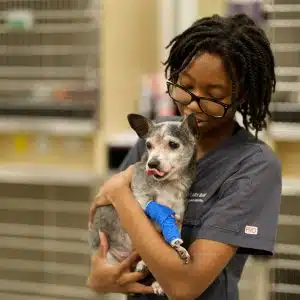Comprehensive Guide to the Services Supplied by a Vet Oncologist
Vet oncology incorporates a wide array of solutions targeted at diagnosing and dealing with cancer cells in family pets. Pet Cancer Surgery. Oncologists utilize innovative analysis methods and use different treatment alternatives customized per pet's requirements. They likewise focus on encouraging treatment and supply useful resources for animal owners. Recognizing these solutions is crucial for making notified choices. What details aspects of vet oncology can significantly affect a family pet's therapy trip?
Comprehending Veterinary Oncology
Veterinary oncology is a customized area concentrated on detecting and treating cancer cells in animals. This discipline incorporates a large range of methods, from clinical treatments such as chemotherapy and immunotherapy to medical treatments aimed at removing lumps. Veterinary oncologists are educated to recognize the unique indications of cancer in numerous species, enabling them to tailor therapy strategies to private people.
In enhancement to typical treatments, vet oncology highlights encouraging care, which plays a vital duty in boosting the lifestyle for damaged animals. This consists of pain monitoring, dietary support, and palliative treatment alternatives. Cooperation with family pet proprietors is important, as they are indispensable to decision-making regarding their pet dogs' treatment courses. As research developments, veterinary oncology continues to develop, using new hope and boosted end results for pets detected with cancer cells. On the whole, this field is fundamental for addressing the complexities of cancer cells in buddy pets.
Advanced Diagnostic Techniques
Advanced analysis strategies play a crucial role in veterinary oncology, giving crucial understandings into the existence and level of cancer in pets. Imaging methods such as ultrasound, CT scans, and MRI are generally employed to picture growths and assess their characteristics. Furthermore, biopsy treatments are essential for acquiring tissue samples, enabling conclusive medical diagnosis and customized therapy plans.
Imaging Modalities Utilized
Imaging techniques play a vital role in the diagnosis and monitoring of cancer in animals. Vet oncologists utilize different sophisticated imaging methods to examine tumor dimension, visibility, and metastasis. Radiography, or X-rays, offers an initial sight of bone and upper body problems, while ultrasound offers real-time imaging of soft cells, enabling for thorough evaluation of internal organs. Computed tomography (CT) improves visualization of complicated anatomical frameworks and allows 3D restorations, helping in exact growth localization. Magnetic vibration imaging (MRI) is invaluable for soft cells distinction, specifically in mind lumps. In addition, nuclear medication strategies such as positron discharge tomography (FAMILY PET) assistance recognize metabolic task within lumps. Collectively, these modalities enhance diagnostic accuracy, guiding reliable treatment methods for oncological individuals.
Biopsy Procedures Explained
Adhering to the preliminary assessment via imaging methods, getting a clear-cut diagnosis usually requires cells sampling via biopsy treatments. Vet oncologists utilize different biopsy strategies based on the lump's location and features. Fine needle goal (FNA) is a minimally intrusive method that extracts cells for cytological exam, ideal for shallow masses. Core needle biopsies give larger cells samples and are valuable for much deeper lumps, enabling histopathological analysis. Surgical biopsies include excising a section or the whole growth, facilitating detailed assessment. These procedures not just validate the visibility of cancer cells yet likewise assist identify its type and quality, directing therapy choices. Each biopsy approach is picked carefully to balance diagnostic accuracy with individual safety and security and convenience.
Treatment Alternatives for Cancer in Animals
When a pet is identified with cancer cells, a range of therapy choices appear to help boost and take care of the condition lifestyle. Vet oncologists normally recommend a multidisciplinary strategy customized to the individual animal's demands, which may consist of surgical treatment, radiation therapy, immunotherapy, or different treatments.
Surgery is commonly employed to remove tumors and affected tissues, potentially causing total remission in some cases. Radiation therapy intends to destroy and target cancer cells, minimizing growth dimension and minimizing signs and symptoms - Board Certified Veterinary Oncologist. Immunotherapy utilizes the animal's immune system to battle cancer better, while alternative treatments could consist of acupuncture or natural supplements to support overall wellness
Each therapy option lugs its own benefits and risks, and vet oncologists work carefully with animal owners to make a thorough plan that aligns with the pet dog's certain diagnosis and the proprietor's desires. The best goal is to enhance the pet dog's convenience and quality of life throughout their cancer cells journey.
Radiation treatment for Animals
Chemotherapy is an usual treatment alternative for animals detected with cancer cells and is usually used in combination with various other therapies described by veterinary oncologists. This therapy includes the administration of certain drugs designed to ruin and target cancer cells, thereby reducing growth dimension and protecting against the spread of the illness. Vet useful content oncologists customize chemotherapy procedures based on the sort of cancer cells, the animal's overall health and wellness, and the desired therapy end result.
Adverse effects can take place, as these medications might additionally impact healthy and balanced cells. Typical responses include nausea or vomiting, vomiting, and temporary modifications in appetite - Pet Cancer Surgery. Veterinary oncologists are furnished to handle these side impacts effectively, making sure the pet's comfort throughout the therapy process. Regular tracking via blood tests and follow-up visits is necessary to examine the family pet's response to radiation treatment and make necessary modifications. Eventually, radiation treatment can give significant benefits, improving the top quality of life for pets facing cancer medical diagnoses

Radiation Treatment in Vet Medication
Radiation therapy acts as an efficient therapy alternative for pets diagnosed with local tumors, offering a targeted method to cancer cells administration. This technique utilizes high-energy radiation to harm the DNA of cancer cells, hindering their capacity to proliferate. It is especially advantageous for tumors that are not open to surgical elimination or for cases where surgery may not be possible because of the growth's area.
Veterinary oncologists tailor radiation protocols based on tumor dimension, location, and kind, along with the pet dog's total wellness. Therapy can be supplied by means of outside beam radiation or brachytherapy, each with distinct benefits. Typically, multiple sessions are called for to take full advantage of effectiveness while reducing side effects.
Although pets might experience momentary reactions such as skin irritation, the overall aim is to reduce lumps and minimize symptoms, inevitably enhancing the pet dog's prognosis and lifestyle. Accordingly, radiation treatment plays a vital role in complete cancer cells care.
Palliative Treatment and Top Quality of Life
Palliative care in vet oncology concentrates on improving the lifestyle for pets dealing with incurable diseases, making certain comfort and self-respect in their final days. This customized method prioritizes pain management, sign control, and emotional support. Vet oncologists evaluate each pet dog's individual needs, customizing treatments to minimize pain and boost overall well-being.
Methods may consist of administering medicines check that for discomfort alleviation, taking care of nausea, and dealing with other stressful signs and symptoms. Additionally, nutritional support is commonly offered to preserve stamina and boost cravings. The psychological facet of palliative treatment is similarly important; developing a tranquil setting helps in reducing anxiousness for both animal and owner.
Eventually, the goal of palliative care is to enable family pets to appreciate their staying time with as much delight and dignity as possible. By concentrating on convenience and top quality of life, vet oncologists play a crucial duty in making certain that family pets and their households browse this challenging journey with compassion and understanding.
Assistance for Pet Dog Owners Throughout Treatment

Emotional Advice for Proprietors
Charting the psychological landscape during a pet's cancer cells treatment can be a frustrating experience for owners. The uncertainty bordering diagnosis and diagnosis can result in sensations of stress and anxiety, despair, and helplessness. Veterinary oncologists identify the importance of emotional assistance and commonly provide support to aid owners navigate this tough trip. Communication is necessary; discussing treatment alternatives and potential results can relieve some worries. Furthermore, supplying confidence that emotional responses are legitimate fosters an encouraging setting. Many oncology clinics may likewise suggest support system or therapy solutions customized for pet dog proprietors, facilitating common experiences. Encouraging owners to prioritize self-care during this time is vital, as their emotional health directly influences their pet's convenience and total therapy experience.

Resources and Educational Products
Steering through the intricacies of a family pet's cancer treatment can be daunting for proprietors, making access to Resources instructional products and dependable resources important. Veterinary oncologists commonly give an array of handouts, brochures, and online products that discuss therapy alternatives, prospective adverse effects, and treatment methods. These resources aid demystify the procedure and empower family pet owners to make enlightened decisions. In addition, numerous oncology facilities provide accessibility to support discussion forums and groups where owners can get in touch with others facing similar obstacles, fostering a sense of area. Educational seminars and webinars performed by vet specialists even more improve understanding, ensuring that owners are well-appointed to browse their animal's journey through cancer therapy with self-confidence and expertise.
Frequently Asked Concerns
Exactly How Can I Prepare My Pet Dog for a Veterinary Oncology Visit?
Preparing an animal for a veterinary oncology see entails gathering medical records, keeping in mind signs and symptoms, and ensuring the pet fits. A calm temperament and acquainted products can assist alleviate anxiousness throughout the consultation.
What Are the Indicators My Pet Dog May Have Cancer Cells?
Indicators that a pet may have cancer cells consist of inexplicable weight-loss, consistent vomiting or looseness of the bowels, uncommon lumps or swellings, lethargy, changes in appetite, difficulty breathing, and changes in actions. Motivate vet focus is crucial.
Just How Can I Support My Animal Emotionally Throughout Treatment?
Supporting a pet psychologically throughout treatment involves giving convenience, keeping regimens, providing gentle love, and making sure a calm setting. Involving in peaceful play and routine companionship aids minimize tension and cultivates a complacency.
Are There Alternative Treatments for Animals With Cancer cells?
Alternate treatments for family pets with cancer consist of acupuncture, natural treatments, and nutritional assistance. These strategies may match conventional therapies, promoting general health. Consulting with a veterinarian is essential for risk-free and effective combination of different treatments.
What Costs Should I Expect for Vet Oncology Services?
The awaited expenses for vet oncology solutions can vary substantially, often affected by diagnostics, therapies, and ongoing care. Pet dog owners ought to plan for costs varying from assessments to specialized treatments, mirroring the intricacy of cancer management.
Partnership with animal proprietors is crucial, as they are essential to decision-making regarding their family pets' therapy courses. Each therapy option lugs its own advantages and dangers, and vet oncologists function closely with animal proprietors to make a complete strategy that straightens with the pet dog's particular medical diagnosis and the owner's wishes. Animals may experience short-term reactions such as skin inflammation, the general goal is to diminish growths and ease signs and symptoms, inevitably improving the family pet's prognosis and quality of life. Support for pet proprietors throughout treatment is crucial in guiding with the emotional difficulties associated with a pet's cancer cells medical diagnosis. Preparing a family pet for a veterinary oncology check out includes celebration clinical records, keeping in mind signs and symptoms, and making sure the family pet is comfortable.